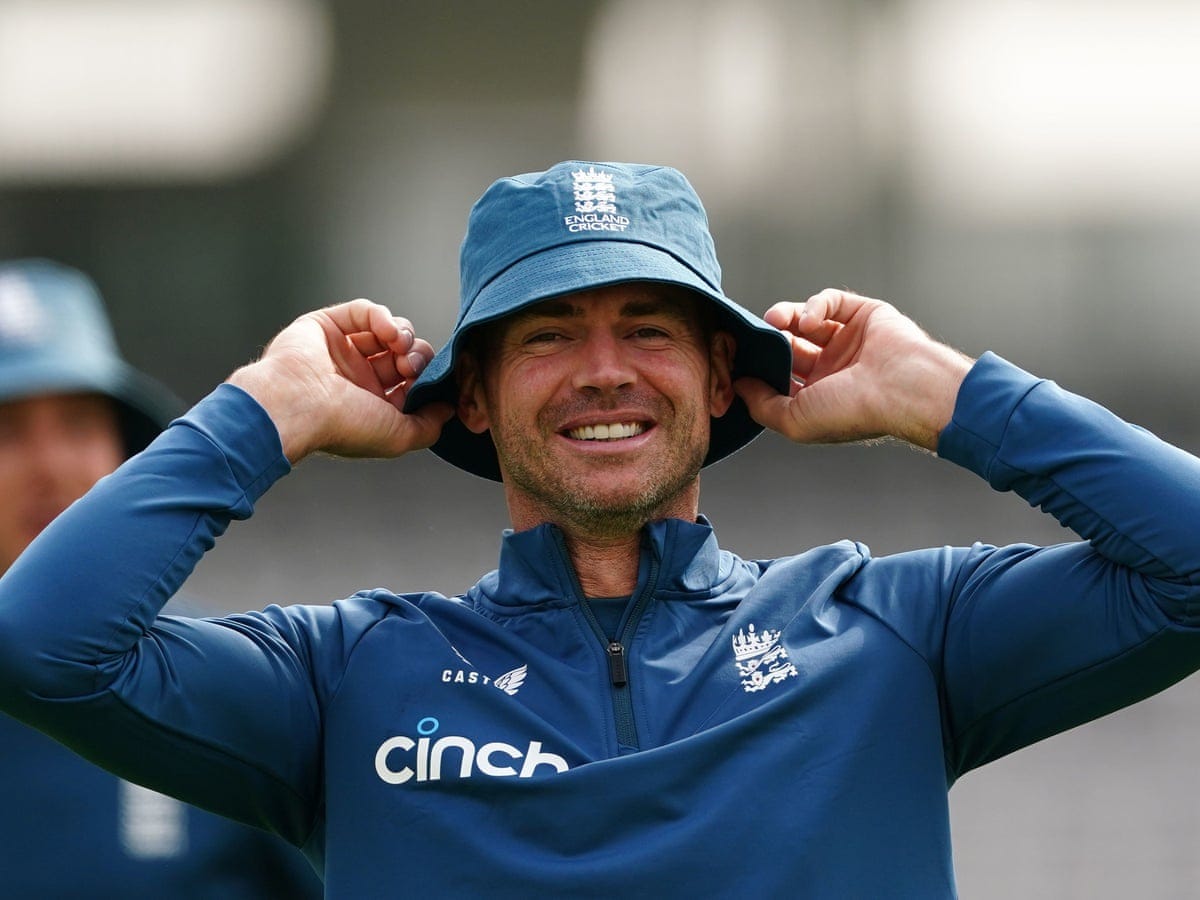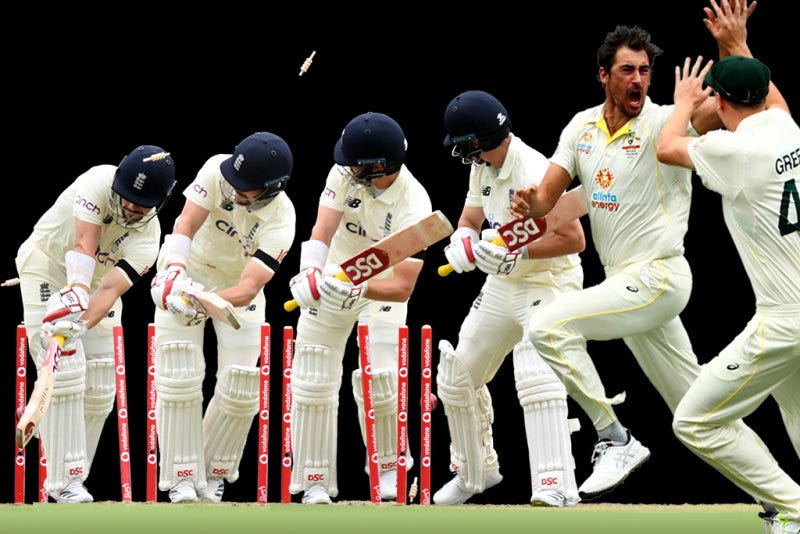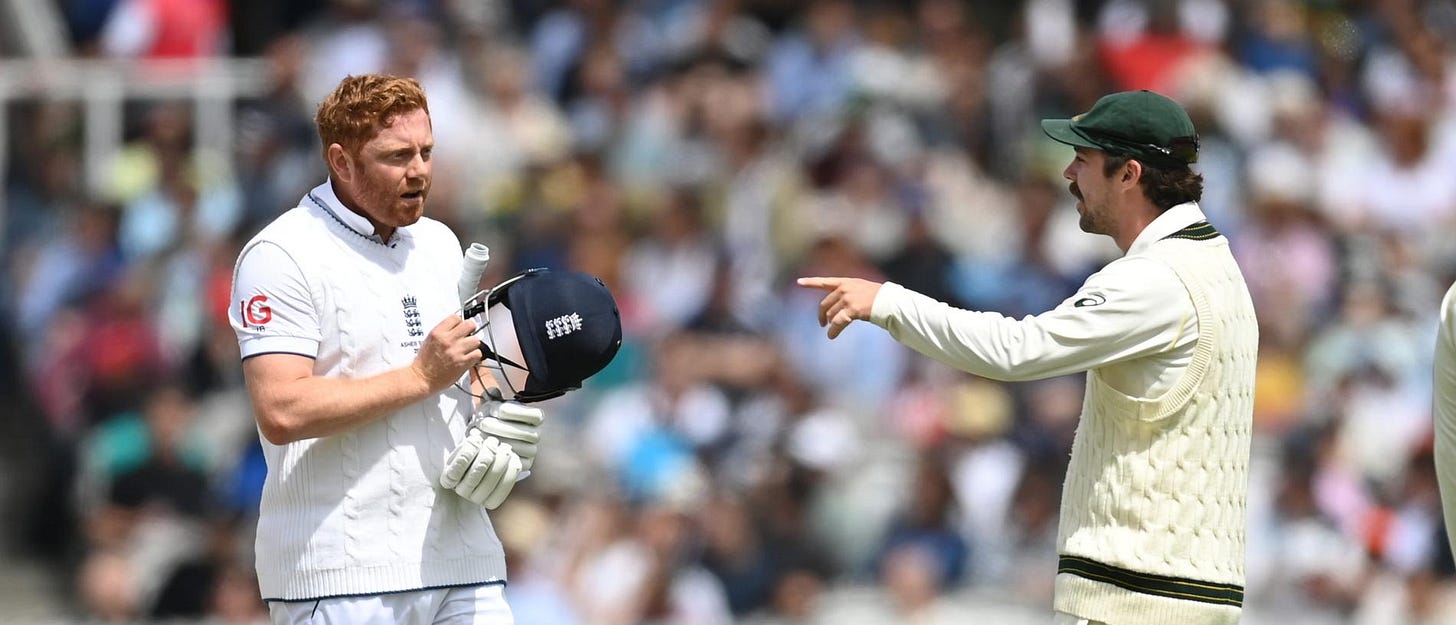Selection Showdown: England and Australia had (have)Tough Choices to Make Ahead of Fourth Ashes Test
I am not telling you anything new here, but England and Australia both faced challenging selection decisions ahead of tomorrow’s fourth Ashes Test Match.
England, as has become their wish, announced their final XI early, and in their minds, it was done Bazball decisively, making just one change after their series-saving win at Headingley. As expected, Jimmy Anderson replaced the ineffective Ollie Robinson. Which begs the question: who will be England’s enforcer at Old Trafford?
Joking aside. Mrs.Robinson you may not be missed.
Across the corridor, Australia will choose a more conservative route—seeming likely to delay naming their final XI until the coin toss. Quite the role-reversal from previous iterations.
David Warner will remain at the top of the order. Mitchell Marsh is set to continue as the all-rounder after an excellent game in Leeds. And I expect Australia to remain true to their want to always play a front-line spinner—Todd Murphy will be hoping for more meaningful overs at Old Trafford.
Leaving just one change—Josh Hazlewood to replace Scott Boland.
SpeakingNick is a reader-supported venture. Free and paid versions are available. The best way to support me is by taking out a paid subscription.
So why hasn’t England chosen to replace Ollie Pope?
It reads like a fair question to me.
Naturally, England will bluff past this, as they have done for most of the series when it comes to pivotal selection matters.
A 1-2 deficit and knowing they have to win both remaining Tests seems like a pretty desperate situation—I say, “desperate times demand clarity of thought.”
Ask any coach in world cricket if having a reliable and productive number three batter is high on their wish list, and the answer will always be yes. No question.
So why not the same for Team England? Does Bazball exclude the conformity of cricket history?
From as far back as Bradman to the recently departed Ricky Ponting—yes, both Australians—great players have routinely occupied this acutely challenging position in the batting order.
It’s true, opening batters have been known to perish first ball before—in Rory Burns case, the first ball of the 2021/22 series. England’s then number three, Dawid Malan, departed soon after, as did Joe Root. England found themselves 3–11 and out of the game before they had time to blink.
And then on the flip side. In 1989, Australia’s Mark Taylor and Geoff Marsh opened the innings and batted the entire first day, leaving their number three, David Boon, with acute pad-rash.
So be ready to face the second ball, or fall asleep with the crossword puzzle!
Enjoying the read? Please feel free to share, this is a public post.
Looking back on time, batting number three demands a high level of skill, and not skill confined to one method of operation. This is a position that tests all facets of batsmanship—I hope that’s still a word!
.Notables to succeed at three would be: Brian Lara, Rahul Dravid, Kumar Sangakkara, Jacques Kallis, Martin Crowe—the list could go on. And, what about England’s Jonathan Trott?
Well, Trott has to be England’s most reliable number three this century. Nearly 4000 runs at an average of 44 stands up well in present company!
With respect, though, Trott is hardly a name to be placed in the upper echelons of Test Match batters or even matched with his positional peers above.
However, to his credit, Trott did represent a commendable level of reliability and productivity during his tenure. Could we say the same for today’s incumbents?
England’s reluctance to select a like-for-like is unfathomable.
With some of the deepest pockets in world cricket and a professional player pool three times the size of other countries—India aside—there must be a likely replacement for Ollie Pope. Turning away from the hand that feeds you appears indefensible. This is Bazball, though!
Managers/selectors/coaches—should always want their team's output to exceed the sum of its parts.
Feeling generous? Great. Why not gift a SpeakingNick subscription to someone who might enjoy the content.
Again, Jonny Bairstow of England has received a lot of attention.
Here's my take:
It wasn’t an avalanche, but there were calls for Bairstow to be replaced by Ben Foakes. England resisted the urge to make a mid-series change of direction. Bairstow survived. Why?
Bairstow’s precarious position persists due to an indifferent return from injury, which has seen his glovework suffer immeasurably; a series of dropped catches, missed stumpings, and general untidiness have helped expose England’s below-average out-cricket.
His batting—which expedited his return to the team—has also been patchy. There is very little to show after an excellent 78 on the first day of the series. Bairstow finds himself batting at seven and at the mercy of a shaky tail. He is also caught between three or four different stools.
Bairstow rightly has his backers.
Brendon McCullum will surely be an advocate.
His captain, Ben Stokes, no doubt relishes having the ‘Bairstow character’ to call upon when needed. The wider team would want Bairstow in the fold also; after all, he helped them pocket some nice win bonuses last summer.
Prior to the Headingley Test, ex-Captain Michael Vaughan championed Bairstow’s destructive batting abilities, saying, "I would stick with him because he is so dangerous down the order."
Vaughan’s view changed after Headingley. "His face and demeanour tell me he is shot to pieces!"
Here is the critical juncture: when to intervene, at what point do you extricate the wounded, replacing him with an able body? You might actually be doing the incumbent a favour.
Simply put, for me, Bairstow is a Bazballer; he fits the management’s mould. He’s on the inside.
The unforeseen rise of Bazball as a populist cricket concept is exacting.
Did England’s new coach really script this? I am convinced Brendon ‘Baz’ McCullum might, at first, regret the momentum Bazball garnered.
Its meaning is as vague as its realisation. What ignited the public’s perception of this pivot to a carefree environment—one where losing doesn’t matter and if you do lose, you can say it felt like you won?
Was Test cricket really on its knees? Did the game need a departure from the norms of Test cricket?
Maybe the rapid permeation of Bazball into public consciousness highlights how hungry audiences are for novelty and disruption of the status quo.
All questions that must be answered.
For now, it’s on to Old Trafford and an optimistic look toward Bill’s mother’s.
As always, thank you for being here.






